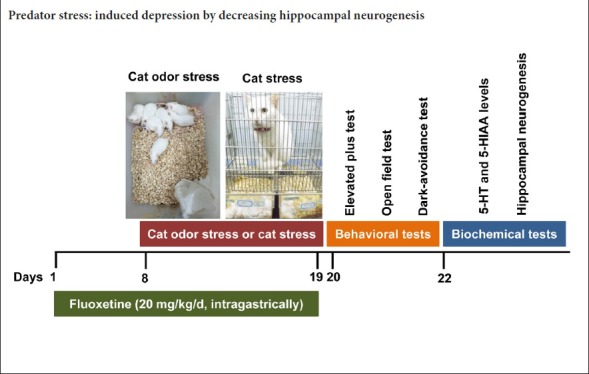- Record: found
- Abstract: found
- Article: found
Predator stress-induced depression is associated with inhibition of hippocampal neurogenesis in adult male mice

Read this article at
Abstract

Abstract
Stress has been suggested to disturb the 5-hydroxytryptamine system and decrease neurogenesis, which contribute to the development of depression. Few studies have investigated the effect of predator stress, a type of psychological stress, on depression and hippocampal neurogenesis in adult mice; we therefore investigated this in the present study. A total of 35 adult male Kunming mice were allocated to a cat stress group, cat odor stress group, cat stress + fluoxetine group, cat odor stress + fluoxetine group, or a control group (no stress/treatment). After 12 days of cat stress or cat odor stress, behavioral correlates of depression were measured using the open field test, elevated plus maze test, and dark-avoidance test. The concentrations of hippocampal 5-hydroxytryptamine and 5-hydroxyindoleacetic acid were measured using high-performance liquid chromatography-electrochemical detection. Neurogenesis was also analyzed using a bromodeoxyuridine and doublecortin double-immunostaining method. Cat stress and cat odor stress induced depression-like behaviors; this effect was stronger in the cat stress model. Furthermore, compared with the control group, cat stress mice exhibited lower 5-hydroxytryptamine concentrations, higher 5-hydroxyindoleacetic acid concentrations, and significantly fewer bromodeoxyuridine +/doublecortin +-labeled cells in the dentate gyrus, which was indicative of less neurogenesis. The changes observed in the cat stress group were not seen in the cat stress + fluoxetine group, which suggests that the effects of predator stress on depression and neurogenesis were reversed by fluoxetine. Taken together, our results indicate that depression-like behaviors induced by predator stress are associated with the inhibition of hippocampal neurogenesis.
Related collections
Most cited references49
- Record: found
- Abstract: found
- Article: not found
Adult hippocampal neurogenesis buffers stress responses and depressive behavior
- Record: found
- Abstract: found
- Article: not found